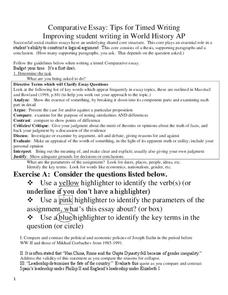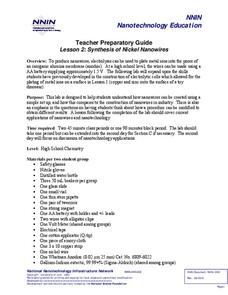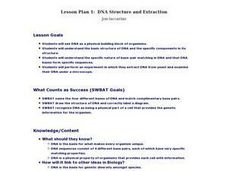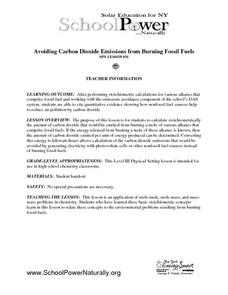Wyatt Bingham
Comparative Essay: Tips for Timed Writing
This site provides a guideline for writing a comparative essay for the AP World History Test. It also provides practice exercises and samples.
National Nanotechnology Infrastructure Network
Synthesis of Nickel Nanowires
It's all about the scale—they're not just wires, they're nanowires! The second lesson of the series builds on the oxidation-reduction experiment in the first lesson. Scholars synthesize a sample of nanowires using electrolysis. As they...
Curated OER
Let's Make a Solar Car
Pupils transform a car that they have built out of K'NEX into a solar car. Students add one or two solar cells to the car to power a DC motor then connect the motor to the car and come up with a method to drive the car. This is the third...
Curated OER
Electrochemistry Problems
In this electrochemistry worksheet, students determine the voltage of a cell based on the reduction potentials. Students write a condensed cell diagram and the oxidation half reaction for the cell. This worksheet has 30 problems to solve.
Curated OER
Tissues
In this tissue learning exercise, students are given notes on 6 types of epithelial tissues, 10 examples of connective tissue, three types of muscular tissue and the components of nerve tissue.
Curated OER
The Immune System
Activate the immune system in the brains of your biologists! This worksheet calls upon learners to explain the structure, function, and problems associated with the immune system. This worksheet is helpful for the advanced placement...
Curated OER
Static Electricity
In this electricity worksheet, students read about static and current electricity and then draw pictures of an electric cell and circuits. Students draw 3 pictures total.
Curated OER
DNA Structure and Extraction
Students see DNA as a physical building block of organisms and comprehend the basic structure of DNA and the specific components in its structure. They can explain the specific nature of base-pair matching in DNA and that DNA bases form...
Curated OER
Electronic Technology
In this electronic learning exercise, students complete 4 short answer, 6 fill in the blank, and 4 term identifications about electronics.
Curated OER
Making Blood!
Ninth graders study facts about human blood and what it is made of. In this blood composition lesson students divide into groups and complete several activities.
Curated OER
Internal Systems and Regulation
In this internal systems and regulation learning exercise, students correctly decide if given statements are true or false. Students apply information learned about the circulatory system to the given statements to determine statements...
Curated OER
6.1 Computing Components
Students define computer terms such as hardware, software, input and output devices, central processing unit, etc. in their own words, and relate terms to computer system they are using.
Virginia Department of Education
The Ratio of Surface Area to Volume
Demonstrate the ratio of surface area to volume in your high school class by using phenolphthalein, gelatin, and an onion. Intrigue the class by leading a discussion on osmosis and diffusion, then making "scientific jello." Participants...
Curated OER
Avoiding Carbon Dioxide Emissions from Burning Fossil Fuels
Chemistry and earth science meet in a lesson plan on carbon dioxide emissions. After reading about atmospheric problems caused by using fossil fuels, science stars balance equations for the burning of different alkanes. They compute the...
Kenan Fellows
Ready, Set, Save on Solar Energy Technology!
Does your class have a bright future in the solar energy industry? Science scholars take an in-depth look at what's new in solar technology. After completing research into the solar industry, participants create and market a product in...
Curated OER
Using the Microscope
High schoolers demonstrate their ability to properly make observations using a compound microscope. They prepare an onion skin slide and focus on it in both low and high power. Then they measure the diameter of one of the cells.
Curated OER
Go Fly a ( Tetrehedral) Kite!
Students research the tetrahedral kites invented by Alexander Graham Bell. In this components of flight lesson plan, students examine the kites made by Bell and his team. Students create their own kite and add them together as a class to...
Curated OER
Biology: Sun, Skin and Cancer
Students identify basic components of skin on a cross sectional diagram. They provide a basic description of cancer in terms of cell biology. Students explore the ABCD of skin cancer/mole evaluation and perform their own evaluation of...
Curated OER
Multi-stage Transistor Amplifiers
In this electrical activity, students design and build a circuit board using diodes, transistors, and dry cell batteries, to grasp the understanding of circuit design before answering a series of 15 open-ended questions that include...
Curated OER
Take Deep Breath
Fifth graders become familiar with how the diaphragm expands to draw air into our lungs and contracts to exhale carbon dioxide. They also label the major parts of the respiratory system through the use of interactive Internet research...
Curated OER
Creating a Universally Designed Lesson Plan
Students investigate plant cells. In this multiple intelligences lesson, students engage in a variety of activities to foster an understanding of plant cells and how they work. Students read, write, observe, and role-play parts and...
Curated OER
Translating Genetic Information
High schoolers explore the process of translation. They determine the correct sequencing and present their strands to the class. In addition, they compare normal red blood cells to sickle cells and complete discussion questions.
Curated OER
Plant Pigments
Students investigate the components of chlorophyll. They use paper chromatography to separate the many pigments of chlorophyll from one another.
Curated OER
Colorful Fractions
Students use charts to show fractions. In this fractions and percents lesson, students review fractions, percents and ratios. Students create tables and color the cells to make different fractions. Students answer questions about each...

























